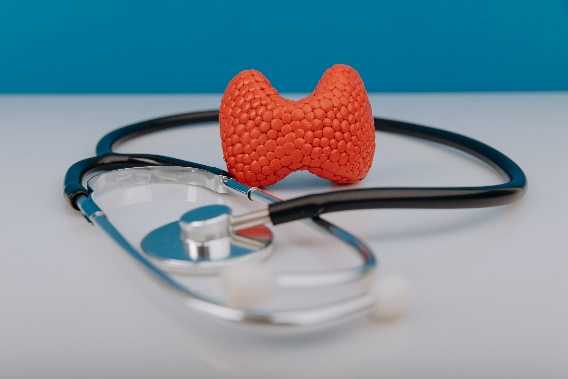What is Hypothyroidism?
Hypothyroidism, commonly referred to as an underactive thyroid, is a condition where the thyroid gland fails to produce sufficient amounts of thyroid hormones. These hormones, particularly thyroxine (T4) and triiodothyronine (T3), play vital roles in the body's metabolism, influencing energy production, regulation of body temperature, and the functioning of various organs, including the heart, brain, and muscles.
The thyroid gland, located at the front lower part of the neck, is regulated by the pituitary gland's thyroid-stimulating hormone (TSH). In a normally functioning body, the thyroid gland responds to the amount of TSH released, ensuring the correct balance of thyroid hormones. However, in hypothyroidism, despite the presence of TSH, the thyroid does not secrete enough hormones, leading to a slowdown in the body's metabolic processes.

Hypothyroidism can manifest in anyone, but it is most seen in women and individuals over the age of 60. The condition may present as subclinical hypothyroidism, where there are minimal or no symptoms, but blood tests reveal elevated levels of TSH and normal levels of thyroid hormone. If left untreated, subclinical hypothyroidism may progress to overt hypothyroidism, characterized by noticeable symptoms and lower levels of thyroid hormones.
The reasons behind the inadequate production of thyroid hormones vary, ranging from autoimmune diseases, such as Hashimoto's thyroiditis, where the body's immune system attacks the thyroid gland, to the aftermath of thyroid surgery or radiation therapy. Other causes include certain medications and iodine deficiency, which is less common in developed countries due to iodized salt.
Early detection of hypothyroidism is crucial as it can significantly impact quality of life. Common symptoms like fatigue, weight gain, and cold intolerance can affect daily activities, but with proper treatment, these symptoms can be managed effectively. Treatment typically involves thyroid hormone replacement therapy, which compensates for the underactive thyroid by restoring hormone levels to their normal range.
Understanding hypothyroidism is the first step towards recognizing its impact on health and wellbeing. Awareness and knowledge can lead to timely diagnosis and treatment, improving outcomes for those affected by this condition.
Common Symptoms of Low Thyroid

Hypothyroidism, or low thyroid function, manifests through a variety of symptoms that can affect multiple body systems. The severity of these symptoms can vary widely among individuals and may develop slowly over several years, making them easy to overlook or attribute to other causes like aging or stress. However, recognizing these symptoms is crucial for timely diagnosis and treatment.
Fatigue: One of the most common complaints among those with hypothyroidism is fatigue, regardless of how much sleep they get. This pervasive tiredness can significantly impair daily functioning and quality of life.
Weight Gain: Unexplained weight gain is another hallmark of hypothyroidism. Despite maintaining a healthy diet and exercise routine, individuals may find it difficult to manage their weight due to a slowed metabolism.
Cold Intolerance: People with hypothyroidism often report feeling unusually cold, particularly in the hands and feet. This symptom is attributed to the decreased metabolism and reduced energy production, affecting the body's ability to regulate temperature.
Dry Skin and Hair: Thyroid hormones play a key role in skin and hair health. Low levels can lead to dry, flaky skin and brittle hair, which may also become thin and fall out easily.
Constipation: Gastrointestinal motility is influenced by thyroid hormones, and reduced levels can lead to chronic constipation, a common and uncomfortable symptom of hypothyroidism.
Depression and Mood Changes: The impact of hypothyroidism isn't limited to physical symptoms; it can also affect mental health. Depression, anxiety, and mood swings are frequently reported, likely due to the overall decrease in thyroid hormone levels affecting brain function.
Menstrual Irregularities and Fertility Issues: Women with hypothyroidism may experience heavier, more frequent, or irregular menstrual periods. The condition can also interfere with ovulation, leading to difficulty in conceiving.
Muscle Weakness and Joint Pain: Muscle aches, joint pain, and stiffness are common and may be severe enough to interfere with daily activities. This is partly due to the accumulation of certain substances in the muscles and joints due to low metabolic rate.
Cognitive Impairments: Known as "brain fog," this symptom encompasses memory lapses, difficulty concentrating, and general mental sluggishness, making tasks that require mental sharpness more challenging.
High Cholesterol Levels: Hypothyroidism can lead to elevated levels of LDL cholesterol (the "bad" cholesterol), increasing the risk for heart disease. This occurs because thyroid hormones are involved in lipid metabolism, and low levels can disrupt this process.
Recognizing these symptoms is critical for diagnosing and managing hypothyroidism. Although everyone may experience a different combination of symptoms, their presence warrants a discussion with a healthcare provider to evaluate thyroid function and consider appropriate treatment options.
Causes of Hypothyroidism
The development of hypothyroidism can be attributed to several factors, each affecting the thyroid gland's ability to produce hormones in its unique way. Understanding these causes is essential for diagnosis and determining the most effective treatment strategy.
Autoimmune Disease: The most common cause of hypothyroidism, especially in countries with sufficient iodine intake, is Hashimoto's thyroiditis. This autoimmune disorder involves the immune system attacking the thyroid gland, leading to inflammation and reduced hormone production. The exact trigger for this autoimmune response is not fully understood but is believed to involve a combination of genetic and environmental factors.
Thyroid Surgery: Removal of a part or all of the thyroid gland (thyroidectomy) due to cancer or other thyroid disorders can lead to hypothyroidism. The extent of the surgery often determines the degree of hormone deficiency.
Radiation Therapy: Radiation used to treat cancers of the head and neck can damage the thyroid gland, resulting in hypothyroidism. Similarly, radioactive iodine treatment, a common therapy for hyperthyroidism, can sometimes overly reduce thyroid function, leading to hypothyroidism.
Medications: Certain medications can interfere with thyroid hormone production. For example, lithium, used to treat bipolar disorder, and amiodarone, a heart medication, are known to affect thyroid function in some individuals.
Iodine Imbalance: Although less common in developed countries, both iodine deficiency and excess can cause hypothyroidism. Iodine is crucial for thyroid hormone production, and its imbalance can disrupt this process.
Congenital Hypothyroidism: Some infants are born with a dysfunctional or entirely absent thyroid gland, a condition known as congenital hypothyroidism. Screening for this disorder is routine in many countries, allowing for early treatment to prevent developmental delays.
Pituitary Disorder: Rarely, a problem with the pituitary gland can hinder its ability to produce TSH, the hormone that stimulates the thyroid to produce thyroid hormones. This secondary form of hypothyroidism can result from pituitary tumors or damage.
Pregnancy: Some women develop hypothyroidism during or after pregnancy (postpartum hypothyroidism) due to the immune system's response. This condition, if not treated, can affect both the mother's and baby's health.
Understanding the underlying cause of hypothyroidism is crucial for tailoring treatment to the individual's specific needs, ensuring the best possible outcomes for managing this condition.
Diagnosing Hypothyroidism
The diagnosis of hypothyroidism is a critical step in managing the condition effectively. It involves a combination of clinical evaluation, symptom assessment, and specific diagnostic tests. The goal is to accurately identify the underactivity of the thyroid gland and its cause, which can significantly influence the treatment approach.
Clinical Evaluation and Symptom Assessment: The initial step in diagnosing hypothyroidism involves a thorough clinical history and physical examination. Healthcare providers will inquire about symptoms that suggest thyroid dysfunction, such as fatigue, weight gain, cold intolerance, and changes in skin and hair quality. A physical exam can reveal signs like a slow heart rate, dry skin, swelling around the eyes, and an enlarged thyroid gland (goiter).
Blood Tests: The cornerstone of hypothyroidism diagnosis is blood testing, which measures levels of thyroid-stimulating hormone (TSH) and thyroxine (T4). Elevated TSH levels indicate that the thyroid gland is not producing enough hormones, prompting the pituitary gland to release more TSH to stimulate the thyroid. Low levels of T4 further confirm the diagnosis of hypothyroidism.
- TSH Tests: The TSH test is often the first test conducted due to its high sensitivity. It can detect even mild (subclinical) hypothyroidism where the T4 levels may still be within the normal range.
- Free T4 Tests: This test measures the amount of T4 that is available to the body’s tissues, providing additional information on the thyroid's activity.
Antibody Tests: In cases where an autoimmune disease is suspected, such as Hashimoto's thyroiditis, doctors may order tests to detect thyroid autoantibodies. The presence of these antibodies can confirm an autoimmune process as the cause of thyroid dysfunction.
Imaging Tests: Although not routinely required for diagnosis, imaging tests like ultrasound can be helpful in assessing the size and structure of the thyroid gland, identifying nodules, and detecting potential causes of hypothyroidism, such as thyroiditis or thyroid gland abnormalities.
Additional Tests: If a secondary cause of hypothyroidism is suspected, where the problem originates from the pituitary gland, further testing may be necessary. This could involve measuring other pituitary hormones or conducting imaging studies of the pituitary gland.
The diagnostic process for hypothyroidism is comprehensive and tailored to the individual's symptoms and clinical findings. Once diagnosed, patients can work with their healthcare providers to develop an effective treatment plan. Early diagnosis and treatment are crucial for preventing the complications associated with hypothyroidism and for improving patients' quality of life.
Treatment Options for Hypothyroidism

The treatment for hypothyroidism is primarily aimed at replenishing the body's deficiency of thyroid hormone to alleviate symptoms and normalize metabolic functions. The most common and effective treatment is hormone replacement therapy, which involves taking synthetic thyroid hormone medication. Treatment plans are individualized based on the severity of the condition, the patient's age, overall health, and the presence of other medical conditions.
Levothyroxine: The standard treatment for hypothyroidism is levothyroxine, a synthetic form of thyroxine (T4). This medication effectively restores normal thyroid hormone levels, relieving symptoms of hypothyroidism. The dosage of levothyroxine is carefully calibrated based on the patient's weight, age, the severity of hypothyroidism, and the presence of other health conditions. It's crucial to monitor thyroid function tests regularly to adjust the dosage as needed.
- Dosage Adjustment: The initial dosage of levothyroxine is determined based on various factors, including the patient's TSH levels. Periodic blood tests are essential to ensure that the thyroid hormone levels are within the target range and to adjust the dosage accordingly.
- Long-term Management: Patients on levothyroxine typically require lifelong treatment. Regular follow-up appointments are necessary to monitor the effectiveness of the treatment and to make any necessary adjustments.
Alternative Therapies: While levothyroxine is the most widely prescribed and effective treatment for hypothyroidism, some patients may explore alternative therapies. These can include natural thyroid hormones derived from animal thyroid glands, such as desiccated thyroid extract. However, these alternatives are not commonly recommended due to variability in hormone concentrations, which can make dosing difficult and less predictable than synthetic forms.
Lifestyle and Diet Considerations: In addition to medication, patients with hypothyroidism may benefit from lifestyle and dietary modifications. Although no specific diet can cure hypothyroidism, consuming a well-balanced diet rich in fruits, vegetables, and lean proteins can support overall health. Certain foods and supplements, such as those containing high levels of iodine or soy, may interfere with levothyroxine absorption and should be discussed with a healthcare provider.
Monitoring and Follow-up: Ongoing monitoring of thyroid function tests is vital for patients with hypothyroidism. This includes regular TSH level checks to ensure that the medication dosage remains optimal. Adjustments may be needed during pregnancy, with significant weight change, or with the initiation of certain medications that can affect thyroid hormone levels.
Treatment for hypothyroidism is highly effective when properly managed. With the right approach, individuals with hypothyroidism can lead healthy, active lives without significant limitations.
The Impact of Hypothyroidism on Pregnancy
Hypothyroidism can significantly impact both maternal and fetal health during pregnancy. Proper thyroid function is essential for normal fetal development, especially during the first trimester when the fetus is entirely dependent on the mother's supply of thyroid hormone. Recognizing and managing hypothyroidism in pregnancy is crucial to prevent complications.
Risks to the Mother and Fetus: Untreated hypothyroidism in pregnancy can lead to several risks, including miscarriage, preterm birth, preeclampsia, and increased risk of fetal death. For the fetus, inadequate thyroid hormone levels can result in neurodevelopmental disorders and decreased IQ. These risks highlight the importance of maintaining optimal thyroid function throughout pregnancy.
Screening and Diagnosis: There is ongoing debate among medical professionals about the need for universal screening for thyroid dysfunction in pregnancy. However, women with known thyroid disorders, symptoms of hypothyroidism, or those at high risk should be tested early in pregnancy. The diagnosis of hypothyroidism during pregnancy is based on TSH levels, which may have different reference ranges than in the general population due to physiological changes in pregnancy.
Treatment: The treatment of hypothyroidism in pregnant women typically involves levothyroxine to ensure adequate thyroid hormone levels. The dosage may need to be adjusted as pregnancy progresses due to increased hormone requirements. Regular monitoring of TSH levels is essential to maintain them within the specific range recommended for pregnancy, which is often lower than the general threshold for hypothyroidism.
Management During Pregnancy: Managing hypothyroidism during pregnancy requires a collaborative approach between obstetricians and endocrinologists. The goal is to adjust levothyroxine dosage as needed based on regular thyroid function tests. Close monitoring is particularly important in the first trimester and postpartum period, as thyroid hormone requirements can fluctuate significantly.
Postpartum Thyroiditis: Some women may develop postpartum thyroiditis, an inflammation of the thyroid gland that occurs after giving birth. This condition can result in temporary hypothyroidism, hyperthyroidism, or a combination of both. While postpartum thyroiditis usually resolves on its own, some women may require treatment or develop permanent hypothyroidism.
The management of hypothyroidism during pregnancy is critical for the health of both the mother and the developing fetus. With appropriate screening, diagnosis, and treatment, most women with hypothyroidism can experience healthy pregnancies and deliver healthy babies.
Complications of Untreated Hypothyroidism
Untreated hypothyroidism can lead to several long-term health complications, highlighting the importance of early diagnosis and management. The effects of prolonged low thyroid hormone levels can impact various bodily functions, leading to significant health issues.
Cardiovascular Complications: Hypothyroidism can contribute to heart disease in multiple ways. The condition is associated with higher levels of LDL cholesterol (the "bad" cholesterol) and increased risk of atherosclerosis. Low thyroid hormone levels can also lead to a slower heart rate, increased diastolic blood pressure, and, in severe cases, heart failure. The combined effects of these factors significantly elevate the risk of coronary artery disease and other cardiovascular problems.

Mental Health Issues: Mental health can also be severely affected by untreated hypothyroidism. Patients may experience depression, anxiety, and cognitive issues such as memory problems and slowed mental functioning. Over time, these symptoms can worsen, leading to significant impairments in daily life and overall well-being.
Myxedema Coma: One of the most severe complications of untreated hypothyroidism is myxedema coma, a rare but life-threatening condition. It represents extreme hypothyroidism, characterized by low body temperature, unconsciousness, and respiratory failure. Myxedema coma requires immediate medical intervention and is more likely to occur in the elderly or those with severe underlying hypothyroidism.
Neurological Impact: Hypothyroidism can affect the nervous system, leading to complications such as peripheral neuropathy—characterized by numbness and tingling in the arms and legs due to damaged peripheral nerves. Additionally, untreated hypothyroidism can exacerbate carpal tunnel syndrome.
Reproductive Issues: In women, untreated hypothyroidism can lead to menstrual irregularities, reduced fertility, and an increased risk of miscarriage. Pregnant women with uncontrolled hypothyroidism may experience complications such as pre-eclampsia, placental abnormalities, and impaired fetal development.
Growth and Developmental Delays in Children: In infants and children, untreated hypothyroidism can lead to cretinism, characterized by stunted physical and mental growth. Early detection and treatment are critical to prevent these developmental delays and ensure normal growth and cognitive development.
The prevention of these complications relies on timely diagnosis and appropriate management of hypothyroidism. Regular monitoring and adherence to treatment can mitigate the risks associated with untreated hypothyroidism, underscoring the importance of awareness and education about this condition.
Hypothyroidism in Children and Teens
Hypothyroidism can affect individuals at any age, including children and adolescents. In this age group, the condition can have distinct implications for growth, development, and general well-being.
Causes and Symptoms: In children, hypothyroidism may be congenital (present at birth) or acquired later. Congenital hypothyroidism is usually detected through newborn screening programs, which are crucial for early intervention. Acquired hypothyroidism in children and teens often results from Hashimoto's thyroiditis. Symptoms may include fatigue, poor growth, delayed puberty, weight gain, constipation, dry skin, and poor performance in school.
Impact on Growth and Development: Thyroid hormones are vital for normal growth and development. Hypothyroidism can lead to growth retardation, delayed skeletal maturation, and intellectual disabilities if not treated promptly. In teens, untreated hypothyroidism can result in delayed puberty and slowed growth.
Diagnosis and Treatment: Diagnosing hypothyroidism in children involves blood tests to measure TSH and thyroid hormone levels. Treatment typically includes levothyroxine, which is adjusted based on growth, development, and regular thyroid function tests. Early and consistent treatment can normalize growth and development, highlighting the importance of early detection and management.
Challenges and Considerations: Managing hypothyroidism in children and teens requires careful consideration of growth and developmental stages. Dosage adjustments must be made in response to growth spurts, changes in body weight, and during puberty. Regular follow-up with a pediatric endocrinologist is essential for monitoring treatment efficacy and adjusting medication as needed.
The prognosis for children and teens with hypothyroidism is excellent with early diagnosis and treatment. With proper management, most can lead healthy, normal lives, achieving appropriate growth and developmental milestones.
Lifestyle and Home Remedies
While the primary treatment for hypothyroidism involves hormone replacement therapy, incorporating certain lifestyle changes and home remedies can support overall health and complement medical treatment.
Dietary Considerations: Although no specific diet can cure hypothyroidism, a balanced diet rich in fruits, vegetables, whole grains, and lean proteins can support thyroid function and overall health. Nutrients particularly important for thyroid health include iodine, selenium, and zinc. However, excessive intake of certain foods like soy and cruciferous vegetables may interfere with thyroid hormone production or absorption in some people.
Physical Activity: Regular exercise can help manage symptoms such as weight gain, depression, and fatigue associated with hypothyroidism. Physical activity boosts energy levels and can improve mood and cardiovascular health.
Stress Management: Chronic stress may exacerbate thyroid dysfunction and symptoms. Techniques such as yoga, meditation, and deep breathing can help manage stress levels and support overall well-being.
Avoiding Interference with Medication: Certain supplements and medications can interfere with the absorption of thyroid hormone medication. Calcium and iron supplements, as well as certain antacids and cholesterol-lowering drugs, should be taken several hours apart from thyroid medication to ensure proper absorption.
Regular Sleep: Adequate sleep is essential for managing fatigue and maintaining overall health. Establishing a regular sleep schedule can help improve energy levels and cognitive function.
Incorporating these lifestyle changes and home remedies can support medical treatment and improve the quality of life for individuals with hypothyroidism. However, it's important to consult with healthcare providers before making significant changes, especially regarding diet and supplements, to ensure they are appropriate and safe.
The Future of Hypothyroidism Treatment
The future of hypothyroidism treatment holds promise for more personalized and effective approaches. Advances in research and technology are paving the way for innovations in diagnosis, treatment, and patient care.
Personalized Medicine: Ongoing research into the genetic aspects of thyroid disorders may lead to more personalized treatment strategies. Understanding individual genetic variations can help predict responses to treatment and tailor therapies to improve efficacy and reduce side effects.
New Treatment Options: Researchers are exploring alternative thyroid hormone formulations and delivery methods, including combination therapies of T3 and T4, to more closely mimic the body's natural thyroid hormone production. These new options could offer benefits for patients who do not fully respond to traditional levothyroxine therapy.
Advanced Diagnostic Tools: Improvements in diagnostic tools, including more sensitive and specific blood tests, are enhancing the accuracy of thyroid disorder diagnosis. These advancements can help identify subclinical cases and optimize treatment timing.
Focus on Autoimmune Treatment: As autoimmune processes underlie many cases of hypothyroidism, treatments targeting the immune system are under investigation. These approaches aim to prevent or reduce the autoimmune attack on the thyroid gland, addressing the root cause of the condition in many patients.
Patient-Centered Care: There is a growing emphasis on patient-centered care, recognizing the importance of considering patient preferences, symptoms, and quality of life in treatment decisions. This approach encourages active patient involvement in their care and treatment planning.
The future of hypothyroidism treatment is evolving, with a focus on providing more effective, personalized, and holistic care. These advancements are expected to improve outcomes and quality of life for those living with hypothyroidism, offering hope for better management of this common thyroid disorder.
Impact of Low Thyroid Symptoms on Hormone Replacement Therapy and Testosterone Replacement Therapy
The intersection of hypothyroidism with hormone replacement therapy (HRT) and testosterone replacement therapy (TRT) presents unique challenges and considerations for both patients and healthcare providers. Understanding the nuanced impact of low thyroid function on these treatments is crucial for optimizing care and ensuring the effectiveness of hormone therapies.
Hypothyroidism and Hormone Replacement Therapy (HRT): Hypothyroidism can significantly influence the efficacy and metabolism of HRT, commonly used in menopausal women and transgender individuals undergoing gender transition. Thyroid hormones play a key role in the metabolic clearance of sex hormones, such as estrogen and testosterone. When thyroid function is low, the metabolism of these hormones can be altered, potentially leading to suboptimal levels and the need for adjustments in HRT dosages. Additionally, symptoms of hypothyroidism, such as fatigue and mood changes, can mimic or exacerbate those of menopause or hormonal imbalances, complicating the clinical picture and management strategies.
Interplay Between Hypothyroidism and Testosterone Replacement Therapy (TRT): In men receiving TRT for conditions such as hypogonadism, the presence of hypothyroidism can affect treatment outcomes. Low thyroid function has been associated with decreased testosterone levels, which can influence the efficacy of TRT. Moreover, both hypothyroidism and low testosterone can contribute to similar symptoms, such as reduced energy levels, decreased libido, and weight gain, making it challenging to discern the primary cause of symptoms and to tailor treatment effectively.
Managing the Impact: The key to managing the impact of hypothyroidism on HRT and TRT lies in comprehensive screening and monitoring. For patients initiating or currently on HRT or TRT, regular assessment of thyroid function should be considered. Adjusting the dose of thyroid hormone replacement to achieve optimal thyroid function can improve the efficacy of HRT and TRT, enhancing patient outcomes. Conversely, for patients on HRT or TRT, monitoring of sex hormone levels and symptoms should guide therapy adjustments, especially in the context of diagnosed hypothyroidism.
Clinical Implications and Future Directions: Ongoing research into the complex interactions between thyroid function and hormone therapy will likely inform future guidelines and personalized treatment approaches. Clinicians are encouraged to adopt a holistic view of patient care, considering the potential interplay between various hormonal systems when managing hypothyroidism, HRT, and TRT. Collaboration between endocrinologists, gynecologists, urologists, and primary care providers is essential for coordinating care and optimizing treatment outcomes for patients affected by these intersecting hormonal issues.
This comprehensive approach underscores the importance of recognizing and addressing the multifaceted effects of low thyroid function on hormone replacement therapies, ensuring that patients receive the most effective and personalized care possible.
Conclusion
The journey through understanding hypothyroidism reveals a condition with widespread impacts, affecting millions worldwide. From its subtle onset to the significant influence on bodily functions and quality of life, hypothyroidism represents a critical area of health that demands attention, awareness, and action. This article has traversed the multifaceted aspects of hypothyroidism, from its symptoms and causes to diagnostic approaches, treatments, and the intersection with hormone replacement therapies. Each section underscores the complexity of managing this thyroid disorder and highlights the importance of a nuanced approach to care.
Recognizing the signs and symptoms of hypothyroidism is the first step in a journey toward health and well-being. The condition's stealthy nature often masks its presence, blending into the fabric of everyday malaise and life's fluctuations. Yet, the consequences of untreated hypothyroidism—a tableau of cardiovascular risk, mental health challenges, reproductive issues, and beyond—paint a stark picture of its potential to diminish life's quality and longevity. This underscores the critical importance of vigilance and education in identifying those at risk.
Diagnosis and treatment of hypothyroidism, while rooted in established medical protocols, are far from a one-size-fits-all solution. The nuanced variations in individual responses to hormone replacement therapy, the impact on pregnancy, and the interplay with other conditions like menopause or low testosterone levels call for a personalized approach. This tailored strategy ensures that treatment not only addresses the biochemical imbalance but also harmonizes with the patient's unique physiological and life circumstances.
The discussion on emerging treatments and future directions in managing hypothyroidism opens a window to optimism. Advances in personalized medicine, driven by genetic insights and innovative therapies, promise a future where treatment is not only more effective but also aligned with each patient's specific needs. This evolution in care will hopefully mitigate the challenges faced today, offering a brighter horizon for those affected.
Ultimately, the fight against hypothyroidism is a collective endeavor. It involves patients, healthcare providers, researchers, and communities in an ongoing dialogue and partnership. Education and advocacy play pivotal roles, empowering individuals with the knowledge to seek help and the tools to manage their condition effectively. As we advance, let us carry forward the message that while hypothyroidism may be a lifelong companion for many, it need not define one's life. With the right approach, individuals can lead vibrant, fulfilling lives, unencumbered by the weight of this condition.
In conclusion, hypothyroidism, with its vast spectrum of impacts, challenges us to look beyond the surface, advocating for a healthcare paradigm that is as dynamic and multifaceted as the lives it aims to improve. Through continued research, patient-centered care, and a commitment to education and awareness, the path forward is one of hope, health, and resilience.
Questions and Answers
Navigating the complexities of hypothyroidism can often leave patients and their families with numerous questions about the condition, its management, and its impact on daily life. In an effort to demystify hypothyroidism and provide clear, accessible information, we delve into some of the most frequently asked questions, offering research-backed answers to help enhance understanding and support informed health decisions.

